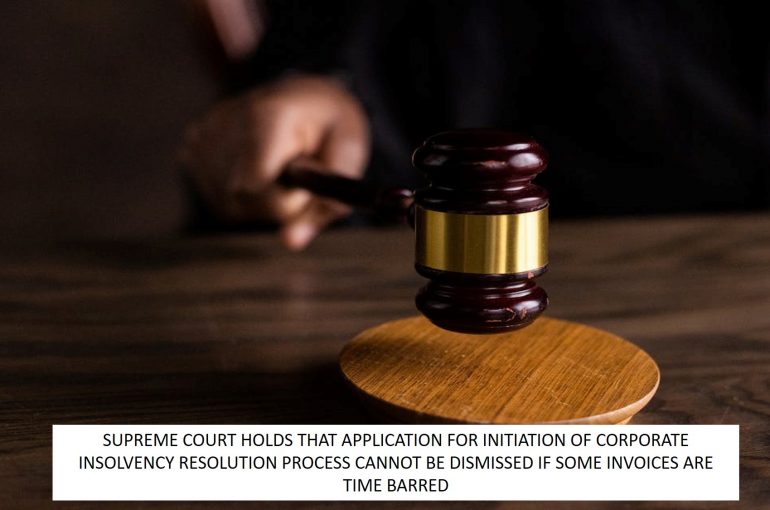SUPREME COURT HOLDS THAT APPLICATION FOR INITIATION OF CORPORATE INSOLVENCY RESOLUTION PROCESS CANNOT BE DISMISSED IF SOME INVOICES ARE TIME BARRED
Recently, a two-Judge Bench of the Supreme Court comprising Justice A.S. Bopanna and Justice J.B. Pardiwala passed a judgment dated 27.03.2023 in M/s Next Education India Private Limited v M/s K12 Techno Services Private Limited in Civil Appeal No.1775 OF 2021, and observed that when a Petition under Section 9 of IBC is filed based on several invoices including some of the invoices are time barred, then the National Company Law Tribunal (“NCLT”) must consider the outstanding invoices which are within limitation and if they cross the minimum threshold of Rs. 1 Crore. The Section 9 Petition cannot be dismissed on the sole ground that some of the invoices are time barred.
FACTS
M/s Next Education India Pvt. Ltd. (Appellant/Operational Creditor) had provided Digital Classroom Solution Services to M/s K12 Techno Services Pvt. Ltd. (Respondent/Corporate Debtor) between 12.03.2011 and 30.06.2017. In view of the services rendered, the Operational Creditor had raised 187 different invoices in which some of the invoices were not fully paid by the Corporate Debtor.
Therefore, the Operational Creditor filed a Petition under Section 9 of Insolvency and Bankruptcy Code, 2016[1] (“IBC”) before the National Company Law Tribunal (“NCLT”), Bengaluru Bench seeking to initiate Corporate Insolvency Resolution Process (“CIRP”) against Corporate Debtor.
The NCLT dismissed the petition as being barred by limitation while considering 12.03.2011 as the starting point of limitation. When the matter went in appeal before the Principal Bench in Company Appeal (AT) (Insolvency) No.98/2019 in National Company Law Appellate Tribunal (“NCLAT”), the Appeal was dismissed on similar grounds vide an Order dated 17.03.2021.
REASONING AND ANALYSIS
Aggrieved by the aforementioned Order dated 17.03.2021 of the NCLAT, the Appellant moved the Supreme Court in an Appeal.
The Corporate Debtor argued that it is a commercially viable going concern and has already paid Rs. 4.5 Crores to the Operational Creditor. Thus, there is no occasion to declare the Corporate Debtor as insolvent.
On the issue of the petition being barred by limitation, the Apex Court observed that the NCLT ought to have considered the subsequent invoices of preceding three years from the date on which petition under Section 9 of IBC was filed. The Apex Court observed that:
“The NCLT considering the starting point of limitation as 12.03.2011 held that the claim is barred by limitation. However, the NCLT did not take into consideration the subsequent invoices at least preceding three years from the date of filing of Section 9 application, which ought to have been considered. Under the circumstances, the NCLT ought to have considered the invoices at least for the period preceding three years from the date of the application under Section 9, rather than considering the starting point of limitation as 12.03.2011. Under the circumstances, the order(s) passed by the NCLT and affirmed by the NCLAT are unsustainable.”
Conclusion
Thus, based on the aforesaid observations, the Supreme Court allowed the Appeal and set aside the orders of dismissal passed by NCLT and NCLAT. The petition under Section 9 of IBC was remitted back to the NCLT for fresh consideration upon law and merits. The Apex Court granted further liberty that all the contentions which may be available to the parties may remain open, including the contention that the Corporate Debtor is economically and commercially sound going concern and hence not required to be declared as insolvent.
Devashish Kakkar
Legal Associate
The Indian Lawyer
[1] Section 9: Application for initiation of corporate insolvency resolution process by operational creditor.





































Leave a Reply